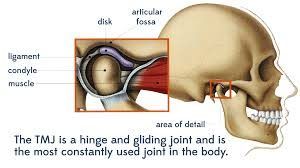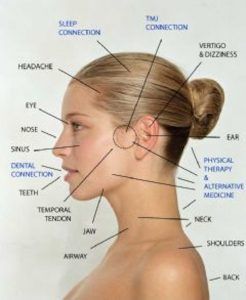TMJ Treatment and Jaw Pain Townsville

TMJ treatment and Jaw pain is a specialisation at TPM Townsville
When our Jaw doesn’t work as it is supposed to, we develop a condition known as Temporomandibular Disorder or TMD. Your Temporomandibular Joint, most commonly referred to as your TMJ, is the most used joint in the body. We use our Jaw to eat, talk, express feelings, demonstrate emotions and most importantly, breathe daily!
If you suffer headaches from daily life stress, clenching, chewing, or clicking TMJ may be a contributing factor.
What is TMJ Dysfunction?
- Teeth Grinding/clenching
- Clicking
- Popping
- limited range of movement and ability to open
- Unable to fully clench your jaw
- Sometimes tenderness around the Jaw
- Headaches, ear pain, dizziness and upper neck pain.
What Causes TMJ?
TMJ dysfunction is considered a multifaceted musculoskeletal disorder.
Most Common Causes of TMJ include:
- Arthritis conditions such as rheumatoid arthritis and osteoarthritis.
- Previous Jaw injury.
- Long-term or Chronic Teeth Grinding or Clenching of teeth.
- Connective tissue diseases may affect the temporomandibular joint.
- Derangement/displacement of TMJ
- Dental concerns- Poor bite, Asymmetrical or Retrognathic (underbite, overbite) .
Additional factors which can contribute to TMJ include:
- Removal of wisdom teeth
- Orthodontic treatment
- Prolonged mouth opening- dental work or sleeping positions
- Myofascial pain
- Neuropsychological factors
- Stress
How is Temporomandibular Disorder (TMJ) Diagnosed?
Temporomandibular Disorder can be diagnosed by a specialist TMJ Physiotherapist, a TMJ Chiropractor, Physiotherapist with further training in jaw dysfunction, your local dentist or orthodontist. Furthermore, TMJ is a movement dysfunction and further testing may be required, such as dental X-rays, CT scan or MRI to further investigate the extent of your condition.

TMJ Assessment
During your TMJ examination, your specialised Physiotherapist or Chiropractor will assess your:
- Muscle tension and length
- Jaw range of motion
- TMJ movement pattern and co-ordination
From here, your TMJ Physiotherapist or Chiropractor will be able to identify if your TMJ complaint is an opening issue or a closing concern.
They will identify if your TMJ is an opening issue:
- TMJ Hyper-mobility, stiffness or arthritis,
- Muscle disorder
- TMJ disc displacement disorder: intermittent or permanent lock
- Cervical spine posture issue.
Or your TMJ is a closing issue:
- Locked open joint, which can be manipulated open
- Occlusion problem, where you will be further referred to your Dentist
What will TMJ Treatment involve?
After your initial TMJ Physiotherapy or Chiropractic assessment your Physio or Chiro will inform you of the appropriate recommended action plan and commence corrective treatment. In conclusion if its believed you require further testing, we can refer you to the most relevant health professional.
Our TMJ specialised physiotherapist and Chiropractors are experts in TMJ complaints. Furthermore, we do work closely with local dentists who are experts within the field of TMJ closing concerns.
TMJ Physiotherapy and Chiropractic exercises and treatment:
- Relaxation techniques and exercises
- Posture improvement and neck treatment
- Neck Muscle lengthening
- Massage
- TMJ stabilisation exercises.
- Joint mobilisation
- TMJ movement pattern and timing correction
- Active exercises
One of our specialised therapists will prescribe exercises once you have been fully assessed and treated for TMJ
TMJ Dysfunction – What to Avoid prior to treatment?
Until you have been in to a Physiotherapist at The Physio Movement Townsville, we recommend you should avoid the following:
- Yawning and any other activities which involved mouth widening
- Chewing hard foods such as raw vegetables
- Nail biting
- Leaning on your Jaw
- High stress levels
- Smoking
Every TMJ condition is different so please book an appointment with our specialised Physiotherapist or Chiropractor today to begin limiting your pain and getting you back to a life of wellness.


